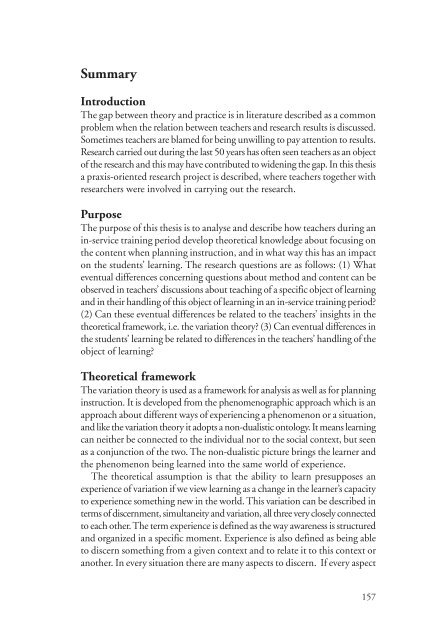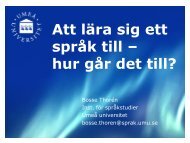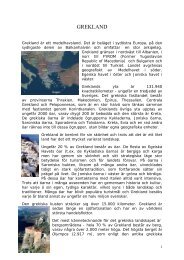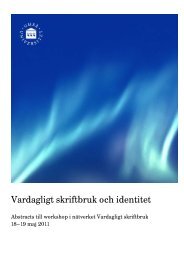Avhandlingens - Umeå universitet
Avhandlingens - Umeå universitet
Avhandlingens - Umeå universitet
You also want an ePaper? Increase the reach of your titles
YUMPU automatically turns print PDFs into web optimized ePapers that Google loves.
Summary<br />
Introduction<br />
The gap between theory and practice is in literature described as a common<br />
problem when the relation between teachers and research results is discussed.<br />
Sometimes teachers are blamed for being unwilling to pay attention to results.<br />
Research carried out during the last 50 years has often seen teachers as an object<br />
of the research and this may have contributed to widening the gap. In this thesis<br />
a praxis-oriented research project is described, where teachers together with<br />
researchers were involved in carrying out the research.<br />
Purpose<br />
The purpose of this thesis is to analyse and describe how teachers during an<br />
in-service training period develop theoretical knowledge about focusing on<br />
the content when planning instruction, and in what way this has an impact<br />
on the students’ learning. The research questions are as follows: (1) What<br />
eventual differences concerning questions about method and content can be<br />
observed in teachers’ discussions about teaching of a specific object of learning<br />
and in their handling of this object of learning in an in-service training period?<br />
(2) Can these eventual differences be related to the teachers’ insights in the<br />
theoretical framework, i.e. the variation theory? (3) Can eventual differences in<br />
the students’ learning be related to differences in the teachers’ handling of the<br />
object of learning?<br />
Theoretical framework<br />
The variation theory is used as a framework for analysis as well as for planning<br />
instruction. It is developed from the phenomenographic approach which is an<br />
approach about different ways of experiencing a phenomenon or a situation,<br />
and like the variation theory it adopts a non-dualistic ontology. It means learning<br />
can neither be connected to the individual nor to the social context, but seen<br />
as a conjunction of the two. The non-dualistic picture brings the learner and<br />
the phenomenon being learned into the same world of experience.<br />
The theoretical assumption is that the ability to learn presupposes an<br />
experience of variation if we view learning as a change in the learner’s capacity<br />
to experience something new in the world. This variation can be described in<br />
terms of discernment, simultaneity and variation, all three very closely connected<br />
to each other. The term experience is defined as the way awareness is structured<br />
and organized in a specific moment. Experience is also defined as being able<br />
to discern something from a given context and to relate it to this context or<br />
another. In every situation there are many aspects to discern. If every aspect<br />
157





